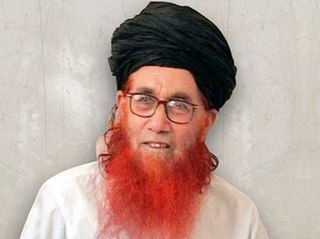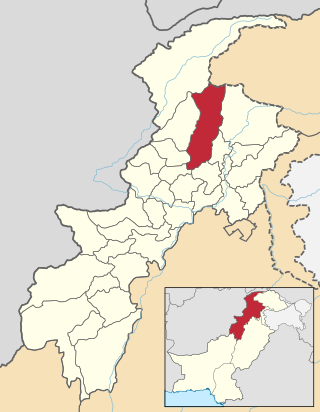Related Research Articles

Jamaat-e-Islami, or Jamaat as it is simply known, is an Islamist political party based in Pakistan and founded by Abul Ala Maududi. It is the Pakistani successor to Jamaat-e-Islami, which was founded in colonial India in 1941. Its objective is the transformation of Pakistan into an Islamic state, governed by Sharia law, through a gradual legal, and political process. JI strongly opposes capitalism, communism, liberalism, and secularism as well as economic practices such as offering bank interest. JI is a "vanguard party", whose members are intended to be leaders spreading party beliefs and influence. Supporters not thought qualified to be members may become "affiliates", and beneath them are "sympathizers". The party leader is called an ameer. Although it does not have a large popular following, the party is quite influential and considered one of the major Islamic movements in Pakistan, along with Deobandi and Barelvi.

Mingora is a city in the Swat District of Khyber Pakhtunkhwa, Pakistan. Located on the Swat River, it is the 3rd largest city in Khyber Pakhtunkhwa and the 26th largest in Pakistan. Mingora is the largest city and the epicenter of social, cultural, and economic activities in Malakand Division, and also the largest in the northern part of Khyber Pakhtunkhwa.
Maulvi Faqir Mohammed is an Islamist militant and, until March 2012, a deputy leader of the Pakistani Taliban umbrella group Tehrik-i-Taliban Pakistan. He was reported as killed on 5 March 2010 during a helicopter gunship attack on militants by the Pakistani military although he denied the reports as false. In July 2011, he resurfaced on the air broadcasting radio shows out of Afghanistan. He was captured in Afghanistan on 17 February 2013, and released by the Afghan Taliban in 2021.

The insurgency in Khyber Pakhtunkhwa, also known as the War in North-West Pakistan or Pakistan's war on terror, is an ongoing armed conflict involving Pakistan and Islamist militant groups such as the Tehrik-i-Taliban Pakistan (TTP), Jundallah, Lashkar-e-Islam (LeI), TNSM, al-Qaeda, and their Central Asian allies such as the ISIL–Khorasan (ISIL), Islamic Movement of Uzbekistan, East Turkistan Movement, Emirate of Caucasus, and elements of organized crime. Formerly a war, it is now a low-level insurgency as of 2017.
Fazal Hayat, more commonly known by his pseudonym Mullah Fazlullah, was a Pakistani militant who was the second emir of the Tehreek-e-Nafaz-e-Shariat-e-Mohammadi and third emir of the Tehreek-e-Taliban Pakistan in Swat Valley. On 7 November 2013, he became the emir of the Tehrik-e-Taliban Pakistan, and presided over the descent of the group into factions who are often at war with each other. Fazlullah was designated by the Al-Qaida and Taliban Sanctions Committee of the Security Council in 2015, and was added to the U.S. State Department's Rewards for Justice wanted list on 7 March 2018. Fazlullah was killed in a U.S. drone strike in Kunar, Afghanistan on 14 June 2018.

Lashkar-e-Islam, also written as Laskhar-i-Islam, is a Deobandi jihadist terrorist group operating in Khyber District, Khyber-Pakhtunkhwa Province, Pakistan and the neighboring Nangarhar Province, Afghanistan.

The Pakistani Taliban, formally called the Tehreek-e-Taliban-e-Pakistan, is an umbrella organization of various Islamist armed militant groups operating along the Afghan–Pakistani border. Formed in 2007 by Baitullah Mehsud, its current leader is Noor Wali Mehsud, who has publicly pledged allegiance to the Afghan Taliban. The Pakistani Taliban share a common ideology with the Afghan Taliban and have assisted them in the 2001–2021 war, but the two groups have separate operation and command structures.

Tehreek-e-Nafaz-e-Shariat-e-Mohammadi is an Islamic extremist militant group. The group swore an oath of loyalty to Baitullah Mehsud, the founder & leader of the Pakistani Taliban and become the part of Pakistani Taliban aftermath the siege of Lal Masjid in 2007. The group's stated objective is to enforce Sharia law in Pakistan.

Sufi Muhammad bin Alhazrat Hassan was a Pakistani cleric and militant, and the founder of Tehreek-e-Nafaz-e-Shariat-e-Mohammadi (TNSM), a militant group vying for implementation of Sharia in Pakistan. It operated mainly in the Dir, Swat, and Malakand districts of Khyber-Pakhtunkhwa.

Operation Black Thunderstorm was a military operation that commenced on April 26, 2009, conducted by the Pakistan Army, with the aim of retaking Buner, Lower Dir, Swat and Shangla districts from the Tehrik-i-Taliban Pakistan after the militants took control of them since the start of the year.

The Second Battle of Swat also known as Operation Rah-e-Rast, began in May 2009 and involved the Pakistan Army and Tehrik-i-Taliban Pakistan militants in a fight for control of the Swat district of Pakistan. The first Battle of Swat had ended with a peace agreement, that the government had signed with the Tehrik-i-Taliban Pakistan in February 2009. However, by late April 2009 government troops and the Tehrik-i-Taliban Pakistan began to clash once again, and in May the government launched a military offensive code-named Operation Black Thunderstorm throughout the Swat district and elsewhere to oppose the Tehrik-i-Taliban Pakistan.
The First Battle of Swat, also known as Operation Rah-e-Haq, was fought between Pakistan and the Tehrik-i-Taliban in late 2007 over control of the Swat District of Pakistan.

The Operation Rah-e-Nijat was a strategic offensive military operation by the unified command of Pakistan Armed Forces against the Tehrik-i-Taliban Pakistan (TTP) and their extremist allies in the South Waziristan area of the Federally Administered Tribal Areas that began on June 19, 2009; a major ground-air offensive was subsequently launched on October 17. It became the integral part of the war in Western fronts which led to the encirclement and destruction of Taliban forces in the region, although the Taliban leadership escaped to lawless areas of neighboring Afghanistan.
Hafiz Gul Bahadur is the leader of a Pakistani Taliban faction based in North Waziristan. Upon the formation of the Tehrik-i-Taliban Pakistan (TTP) in December 2007, he was announced as the militant group's overall naib amir under Baitullah Mehsud, who was based in South Waziristan, but has largely distanced himself from the TTP due to rivalries with Mehsud and disagreements about the TTP's attacks against the Pakistani state.
Ehsanullah Ehsan is a former spokesman of Tehreek-e-Taliban Pakistan (TTP) and later Jamaat-ul-Ahrar. As a spokesperson of the groups, Ehsan would use media campaigns, social media networks and call up local journalists to claim responsibility for terrorist attacks on behalf of the groups. He was initially a spokesman for the Tehreek-e-Taliban Pakistan (TTP). In 2014, he left TTP after he had developed ideological differences with the TTP leadership following the appointment of Fazlullah as the leader of the group. He later co-founded Jamaat-ul-Ahrar and became its spokesman. In 2015, as a spokesman of Jamaat-ul-Ahrar, he condemned Fazlullah-led Tehrik-e-Taliban attack on a school in Peshawar.
Omar Khalid Khorasani was a Pakistani militant and one of the founding members of Tehreek-i-Taliban Pakistan (TTP). In 2014, he formed his own splinter militant group called Jamaat-ul-Ahrar (JuA) and was ousted by the Mullah Fazlullah-led Taliban. The same year, JuA swore allegiance to Islamic State (ISIS), however, a year later JuA rejoined TTP.
Maulana Shah Dauran was an Islamist militant from Swat, Pakistan. He was a deputy of Fazlullah, the chief of the Pakistani Taliban in Swat. He was one of the most wanted militants and the closest aide of Swat Taliban chief Maulana Fazlullah. He was known for his hawkish views against the opponents. The government of Khyber Pakhtunkhwa announced a 10 million rupees bounty on Dauran.
Mufti Noor Wali Mehsud, also known as Abu Mansoor Asim, is a Pakistani Islamic scholar, cleric and jurist who is the 4th emir of the Pakistani Taliban. On 22 June 2018, Mehsud was appointed as the emir of TTP after the assassination of former emir Mullah Fazlullah in a US drone strike in Kunar, Afghanistan.
Pakistan and Tehrik-i-Taliban Pakistan peace talks was a ceasefire negotiation between the Pakistani government and banned terrorist organization namely Tehrik-i-Taliban Pakistan. Its goal is ending a two-decades long war and hostilities in Pakistan. The talks are held in western Khost province of Afghanistan while the Taliban government played crucial role to bring both parties on the dialogue table. In October 2021 then-Pakistani prime minister Imran Khan expressed his view that "...if TTP surrender and accept Pakistan's law, then they will be free from charges." However, TTP denied the state of prime minister.
On 13 September 2022, five people, including the former head of the Peace Committee and two policemen, were killed in a bomb blast in Swat district of Khyber Pakhtunkhwa. In a statement, the Tehreek-e-Taliban Pakistan has accepted the responsibility for the blast, but the authorities have not yet confirmed this claim.
References
- 1 2 3 4 Asghar, Raja (2009-04-14). "Sharia for Malakand as Zardari signs law". Dawn Media Group. Retrieved 2009-04-20.
- 1 2 3 4 5 "Pakistan passes Swat Sharia deal". BBC News. 2009-04-13. Retrieved 2009-04-21.
- 1 2 3 Hasan, Syed Shoaib (2009-04-24). "Swat Taleban find Sharia a challenge". BBC News. Retrieved 2009-04-27.
- ↑ Haider, Zeeshan (2009-04-04). "Q+A - What's fallout from Pakistan taking fight". Thomson Reuters. Retrieved 2009-04-04.
- ↑ Qayum, Khalid; Khaleeq Ahmed (2009-10-25). "Pakistan Deploys Troops in Swat to Curb Militants (Update1)". Bloomberg. Retrieved 2009-04-22.
- ↑ Masood, Salman (2009-02-25). "Maulana Fazlullah". New York Times. Retrieved 2009-04-22.
- ↑ "Top Pakistani militant released". BBC News. 2008-04-21.
- 1 2 Toosi, Nahal (2009-02-15). "Taliban to cease fire in Pakistan's Swat Valley". Yahoo News. Archived from the original on February 16, 2009. Retrieved 2009-02-15.
- 1 2 3 Jan, Delawar (2009-02-17). "Nizam-e-Adl Regulation for Malakand, Kohistan announced". The News International. Archived from the original on June 16, 2009. Retrieved January 7, 2022.
- 1 2 "Pakistan agrees Sharia law deal". BBC News. 2009-02-16. Retrieved 2009-04-27.
- 1 2 Ali, Zulfiqar; Laura King (2009-02-17). "Pakistan officials allow Sharia in volatile region". Los Angeles Times. Retrieved 2009-04-22.
- ↑ "Pakistan Blasted for Creating Taliban Safe Haven With Islamic Law Deal". Fox News. 2009-02-17. Retrieved 2009-04-22.
- ↑ "Top Pakistani militant released". BBC News. 2008-04-21. Retrieved 2009-04-22.
- ↑ Perlez, Jane (2009-02-24). "Taliban Accepts Pakistan Cease-Fire". New York Times. Retrieved 2009-04-22.
- ↑ Khan, M Ilyas (2009-04-15). "Doubts remain as Sharia bill signed". Islamabad: BBC News. Retrieved 2009-04-27.
- ↑ "Sufi Mohammed calls off Swat peace deal". Dawn. 2009-04-09. Retrieved 2009-04-09.
- ↑ Gohar, Gohar Ali; Hameedullah Khan (2009-04-04). "Taliban to stay armed as military operations continue". Dawn Media Group. Retrieved 2009-04-04.
- 1 2 3 4 "Swat sharia deal worries Afghans". Al Jazeera. 2009-04-15. Retrieved 2009-04-21.
- 1 2 "Grey areas in Nizam-i-Adl Regulation". Dawn Media Group. 2009-04-14. Retrieved 2009-04-20.
- ↑ "Haqqani appears in US comedy show". The News International. 2009-05-15.
- ↑ Mackey, Robert (2009-05-14). "Sifting Through 'Debris of the Past' to Make Sense of Pakistan's Taliban Problem". The New York Times.
- ↑ Wiseman, Paul; Zafar M. Sheikh (2009-04-21). "Pakistan's Sharif urges dialogue to quell insurgency". USA Today. Retrieved 2009-04-21.
- ↑ "Taliban want control outside Swat also: Nawaz". Dawn. 2009-04-21. Archived from the original on April 23, 2009. Retrieved 2009-04-21.
- ↑ "US need not worry about Nizam-e-Adl: PM". Daily Times. 2009-04-21. Retrieved 2009-04-21.
- ↑ Mohammed, Arshad (2009-04-23). "Clinton says Pakistan is abdicating to the Taliban". Reuters. Retrieved 2009-04-23.
- ↑ Gall, Carlotta; Eric Schmitt (2009-04-23). "U.S. Questions Pakistan's Will to Stop Taliban". New York Times. Retrieved 2009-05-01.
- ↑ Ali, Zulfiqar; Laura King (2009-02-17). "Pakistan officials allow Sharia in volatile region". Los Angeles Times. Retrieved 2009-02-17.
- ↑ Hasan, Syed Shoaib (2009-04-21). "Swat's Taleban expand operations". BBC News. Retrieved 2009-04-21.
- ↑ Hussain, Zahid; Matthew Rosenberg (2009-04-26). "Pakistan Launches Offensive Against Militants". Wall Street Journal. Retrieved 2009-04-26.
- ↑ "'Civilians flee' Pakistan fighting". Al Jazeera. 2009-04-27. Retrieved 2009-04-27.
- 1 2 Gall, Carlotta; Ismail Khan (2009-04-27). "Pakistani Offensive Puts Truce on Shakier Ground". New York Times. Retrieved 2009-04-28.